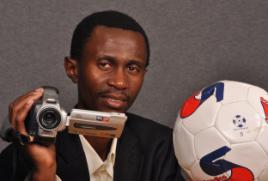Congolese refugee Jimmy relies on soccer ball, video camera and French skills to make new life
Published on 04 May, 2011
Jimmy Bin Rumanya now lives in the peaceful suburbs of Rockhampton with his wife Ruth and studies multi-media at CQUniversity. However, things would have been much different if it was not for a soccer ball, a video camera and some French skills, which helped him survive the turbulent years following civil war in the Congo.

Jimmy Bin Rumanya shows off two of his interests which helped him survive his ordeal
As a school boy, Jimmy was keen on drama and worked as a TV station presenter. But his life was turned upside down when his father and other immediate family members were either shot or burned in their houses by militia. Some family members survived but were scattered, including his mother who ended up in Zambia.
Using the excuse of seeking a news story, Jimmy fled to Kenya with only a video camera and his wits. He spoke no English but had learned to say 'hello' from watching the BBC on TV.
"So I bought a soccer ball and went to schools to apply for a job as a soccer coach to scratch together some money," he said.
Jimmy was so successful as a coach, his school teams won several trophies and he was able to establish a football academy in Nairobi. Some of his players earned sporting bursaries at capital city schools and a few even made it to the Kenyan national team.
Meantime. Jimmy also gained work as a French teacher, did projects for Kenyan TV stations and enrolled for college, studying computing, programming and mass communication. He was soon offering workshops on how to film events like weddings and conferences and also taught computer science.
"As a French teacher I was given the opportunity by many high schools and colleges to set French examinations to prepare their final candidates for the French national examination," he said.
"I also directed French drama plays and made short films and was given a token by the French Embassy to perform for different schools offering French as second language in Kenya."
The keen film maker was even able to make video documentaries about a new orphanage in Kenya, sponsored by British Airways. He made another documentary about the life of a single mother from Tanzania who was living in a single-room house in Kenya. The mother and her son were subsequently helped by the orphanage.
Just when Jimmy had started to rebuild his life, including getting married (his wife Ruth wife was also a refugee who left Congo and sought refuge in Burundi, then Kenya), he was asked to set up a local branch for the ruling political group based in the Congo.
"However, I discovered they were evil and involved with atrocities with women being raped in the east of Congo, so I resigned as branch chairman and they put pressure on Kenya to make me leave."
But Jimmy had one more ace up his sleeve. He had photos showing how children in the Congo had been coerced into acting as child soldiers. So he took the photos and told his story at several foreign embassies, including that of Australia. His United Nations case file showed he was eligible as a refugee.
"My flight ticket to Australia was paid by a group of Australian well-wishers called 'Sanctuary'," he said.
That's how Jimmy came to arrive in Australia, where he initially settled in the Inverell region in 2009. It was not long before he was demonstrating his video skills as he entered a New England film festival, gaining second prize for a documentary about marital separation.
The cool NSW weather was not good for Ruth's health but luckily the couple were invited to a wedding in Rockhampton and realised they enjoyed the tropical weather.
Jimmy was able to enrol in CQUniversity's LIFT* access program to prepare his language and academic skills for undergraduate study and this year he has started his multi-media degree studies with Commonwealth assistance and a merit scholarship.
* Term two applications close on June 17 for LIFT's next intake. Prospective students can contact the student contact centre on 13 27 86. Applications for Lift enrolment can also be found on the bridging programs website at http://content.cqu.edu.au/FCWViewer/view.do?page=10632

